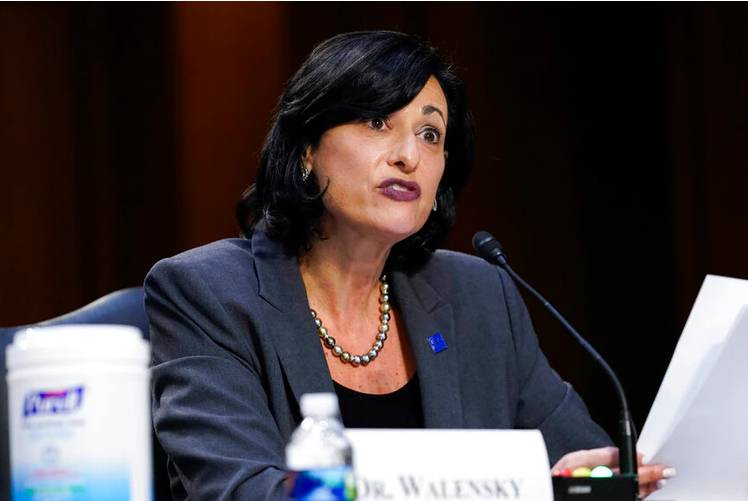As cases of the coronavirus continue to rise in the United States, officials are racing to open up vaccine eligibility in the hope of staving off another wave of the pandemic.
Dr. Rochelle Walensky, head of the U.S. Centers for Disease Control and Prevention, expressed concern Friday about rising case numbers, noting the seven-day average daily case count was up 7% over the past week.
“We have seen cases and hospital admission move from historic decline to stagnation to increases, and we know from prior surges that if we don't control things now there is a real potential for the epidemic curve to soar again,” she said at a White House briefing.
Walensky noted that about 1,000 Americans a day are dying of COVID-19 and said, “Please take this moment very seriously.”
As of Friday evening, the U.S. led the world in the number of COVID-19 cases since the pandemic began, with 30.2 million, and the number of deaths, with more than 548,000, according to the Johns Hopkins Coronavirus Resource Center. Globally, more than 126 million people have contracted COVID-19 and almost 2.8 million have died.
Inflection point
New U.S. cases peaked at nearly 260,000 a day in early January, and that month saw an average of more than 3,100 people dying every day. Case numbers and deaths began to fall later in January and continued to drop in February.
Currently, case numbers are starting to rise, with the average daily case count at 57,000. The increase comes at a time when optimism of a return to normal is growing in the United States with more and more Americans being vaccinated. CDC data on Friday showed that 27% of the U.S. population had received at least one vaccine dose and nearly 15% had been fully vaccinated.
Health officials have indicated that the U.S. could be at an inflection point for the pandemic: a time when the country either turns the corner in its battle with the virus or faces a setback.
Dr. Anthony Fauci, the government's top infectious-disease expert, said at a White House briefing earlier this week: “I'm often asked: Are we turning the corner?
“My response is really more like: We are at the corner. Whether or not we're going to be turning that corner still remains to be seen.”
On March 4, Fauci told CNN that states shouldn’t ease restrictions to prevent COVID-19 until new coronavirus cases fell below 10,000 daily.
U.S. officials have been warning about the danger of more contagious variants of the virus, like the one first identified in Britain, which is now causing new surges of the pandemic in a number of European countries.
Last week, Fauci said that variant likely accounted for 20% to 30% of coronavirus infections in the United States, adding that the numbers were likely growing. If the variant were to become the dominant strain in the United States, health officials say, reinfections would become more likely among those who have already had COVID-19. Such reinfections, along with the higher transmission rate of the variant, could lead to a wave of new cases.
Race to vaccinate
To try to stave off the spread of the new variants, the Biden administration and U.S. state officials are trying to speed up the pace of vaccinations across the country.
The governors of South Carolina and Kansas announced Friday that their states would open up vaccine eligibility next week to anyone older than 16.
They will join at least a dozen states that have allowed those 16 and older to schedule vaccination appointments. At least 34 states have announced plans to make everyone 16 and older eligible for the vaccine by mid-April, according to a review by The Washington Post.
Of the three vaccines approved for emergency use in the United States, the Pfizer-BioNTech vaccine is authorized for those 16 and older while the Moderna and Johnson & Johnson vaccines are approved for those 18 and older. No vaccine has been approved for anyone younger than 16.
President Joe Biden has set a deadline of May 1 for all states to open up vaccinations to all adults. Jeff Zients, coordinator of the White House coronavirus response, said 46 states have confirmed that they will be able to meet the deadline.
He acknowledged, however, that some states were opening up their eligibility for adults more quickly than planned because they had not been able to fill appointments for the most vulnerable populations, including the elderly and those with underlying health conditions.
"If there are states that are lagging behind, we’re working with those states to ensure they continue to prioritize the most vulnerable populations,” he said during a briefing Friday.
Data from the CDC on Friday showed that more than 71% of people 65 and older had received at least one vaccination shot.
3 more vaccination centers
The White House announced Friday that three more cities — Boston, Massachusetts; Norfolk, Virginia; and Newark, New Jersey — were getting new federally run mass vaccination centers as part of the president’s new goal of vaccinating 200 million Americans by the end of April. Biden had previously set a goal of vaccinating 100 million Americans during his first 100 days in office, a goal he surpassed last week.
Zients said that while the pace of vaccinations was encouraging, there is still concern about the increasing case numbers of the coronavirus across the country.
“It is clear there is a case for optimism, but there is not a case for relaxation," he said. "This is not the time to let down our guard.”
(VOA)

